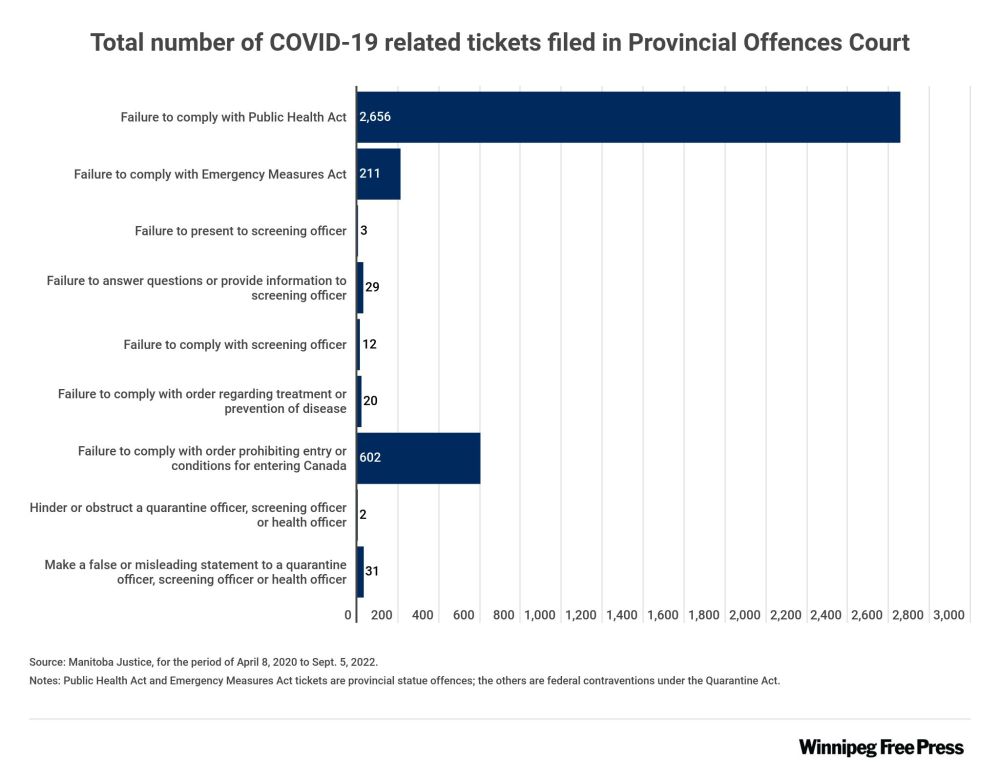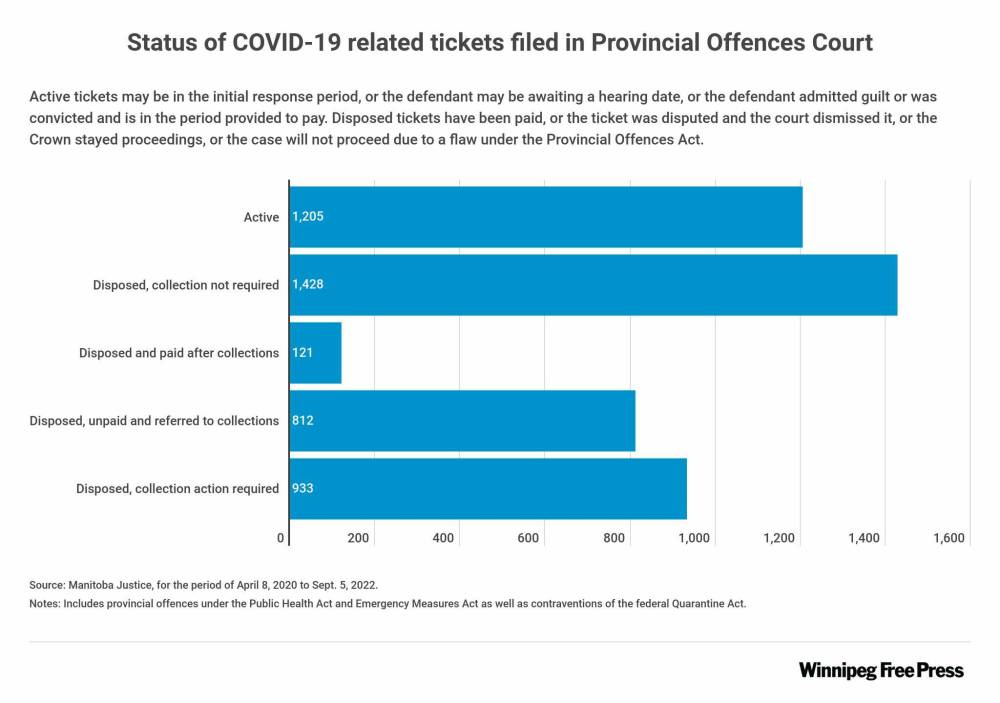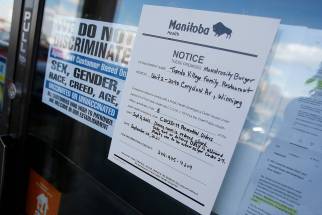Ninety per cent of $8.5 million in Manitoba COVID-19 tickets unpaid
Read this article for free:
or
Already have an account? Log in here »
To continue reading, please subscribe:
Monthly Digital Subscription
$0 for the first 4 weeks*
- Enjoy unlimited reading on winnipegfreepress.com
- Read the E-Edition, our digital replica newspaper
- Access News Break, our award-winning app
- Play interactive puzzles
*No charge for 4 weeks then price increases to the regular rate of $19.00 plus GST every four weeks. Offer available to new and qualified returning subscribers only. Cancel any time.
Monthly Digital Subscription
$4.75/week*
- Enjoy unlimited reading on winnipegfreepress.com
- Read the E-Edition, our digital replica newspaper
- Access News Break, our award-winning app
- Play interactive puzzles
*Billed as $19 plus GST every four weeks. Cancel any time.
To continue reading, please subscribe:
Add Free Press access to your Brandon Sun subscription for only an additional
$1 for the first 4 weeks*
*Your next subscription payment will increase by $1.00 and you will be charged $16.99 plus GST for four weeks. After four weeks, your payment will increase to $23.99 plus GST every four weeks.
Read unlimited articles for free today:
or
Already have an account? Log in here »
Hey there, time traveller!
This article was published 21/09/2022 (1180 days ago), so information in it may no longer be current.
The province has collected only $800,000 of the $8.5 million owed in COVID-19 fines, despite the Tory government promising it would make rule-breakers pay.
In Manitoba, 3,556 tickets amounting to $8,587,481 in fines have been issued for violations of provincial and federal pandemic restrictions.
Provincial government data show that as of Sept. 5, $779,775 in fines had been collected for tickets issued under the Provincial Offences Act for provincial statute offences, federal contraventions and municipal bylaw offences.
Justice Minister Kelvin Goertzen said collections are taking time because a lot of the fines have been contested.
DAVID LIPNOWSKI / THE CANADIAN PRESS FILES Justice Minister Kelvin Goertzen didn't know if anyone in Manitoba was prevented from renewing their licence for not paying a fine.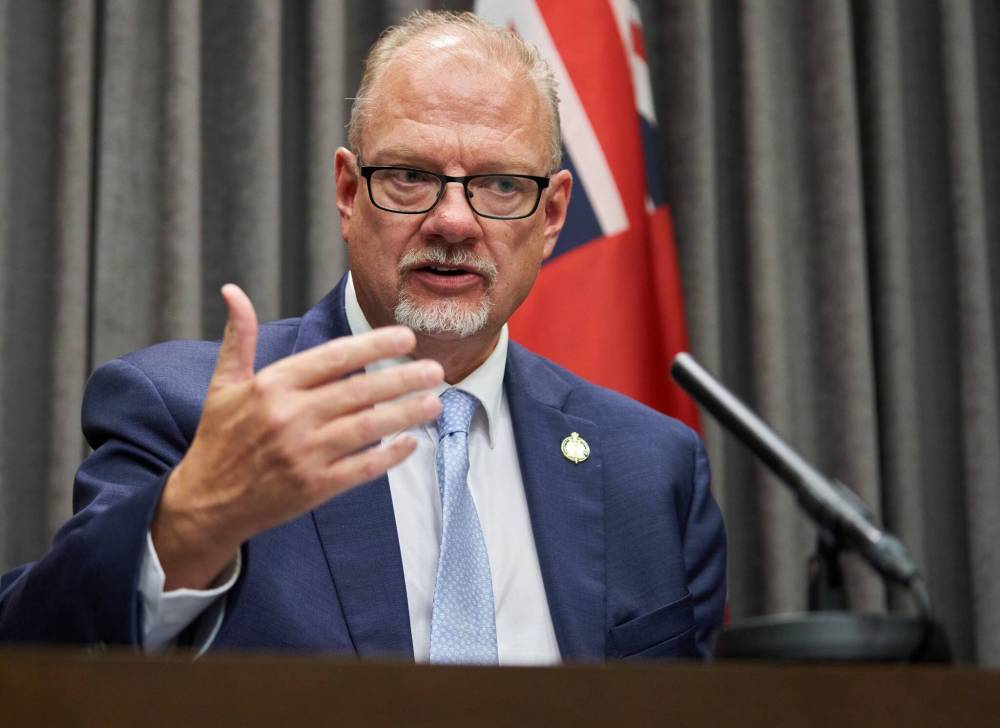
“I think what’s happened with a lot of these particular fines is that they’ve been going to court, and they’re contesting them. So, that’s been a longer process,” Goertzen said Wednesday. “Of course, that is a person’s right, whether they get a fine because it was a COVID violation or they get a fine for illegal parking, they do have the right to go to court.”
The 2,867 provincial fines that were issued, which are worth $3,837,291, include 2,656 for failing to comply with a public health order and 211 for violating the province’s Emergency Measures Act.
They include fines ranging from $298 for failing to wear a mask in a public place, to a $1,296 ticket for individuals and $5,000 for businesses that failed to comply with a public health emergency order. Manitoba lifted most pandemic restrictions, including the requirement to wear masks in public, on March 15. The state of emergency that was first declared on March 20, 2020, expired on Oct. 21, 2021.
Another 699 federal tickets amounted to $4,750,190 in fines for violating the federal Quarantine Act, such as crossing the Canada-U.S. border and failing to present to the nearest entry point. The offense carries a $1,463 fine.
At the start of this month, 1,205 tickets were considered “active,” as the defendant waits for a hearing date, or has time to pay following an admission or a conviction. Of the 907 provincial offence tickets, 92 were issued to businesses and 815 to individuals. There were 298 Quarantine Act fines that remain active.
In total, 1,428 tickets were considered disposed or dealt with: either the ticket was paid, disputed and dismissed by the court, or the proceedings were stayed by the Crown. They include 1,103 provincial tickets: 178 issued to businesses and 925 to individuals.
Another 933 tickets were disposed but collection was required. Of the 857 provincial offence tickets that went to collections, only seven businesses and 108 individuals paid up, the data show. Most — 719 individuals and 23 businesses — did not. Only six people fined under the federal Quarantine Act paid up. Seventy did not.
After the province dropped nearly all pandemic response restrictions six months ago, those unpaid fines remain on the books.
“The fines stay on the book because they were lawfully issued fines pursuant to relevant public health emergencies legislation,” University of Manitoba assistant law Prof. Gerard Kennedy said.
“The fact that the pandemic is over, doesn’t mean that the fine wasn’t lawfully issued or that the individuals who have been fined, assuming the ticket was issued lawfully, didn’t actually contravene the public health orders and should face the consequences of contravening the public health orders,” Kennedy said.
In April 2021, in the thick of the pandemic as Manitoba averaged more than 150 COVID-19 deaths a day, then-premier Brian Pallister promised he’d make scofflaws pay.
“I will say to those folks: you will pay your fine, and if you do not, you will not be driving your car,” Pallister said at a news conference after beefing up enforcement of pandemic rules intended to reduce the spread of COVID-19.
JOHN WOODS / WINNIPEG FREE PRESS FILES In April 2021, in the thick of the pandemic as Manitoba averaged more than 150 COVID-19 deaths a day, then-premier Brian Pallister promised he’d make scofflaws pay.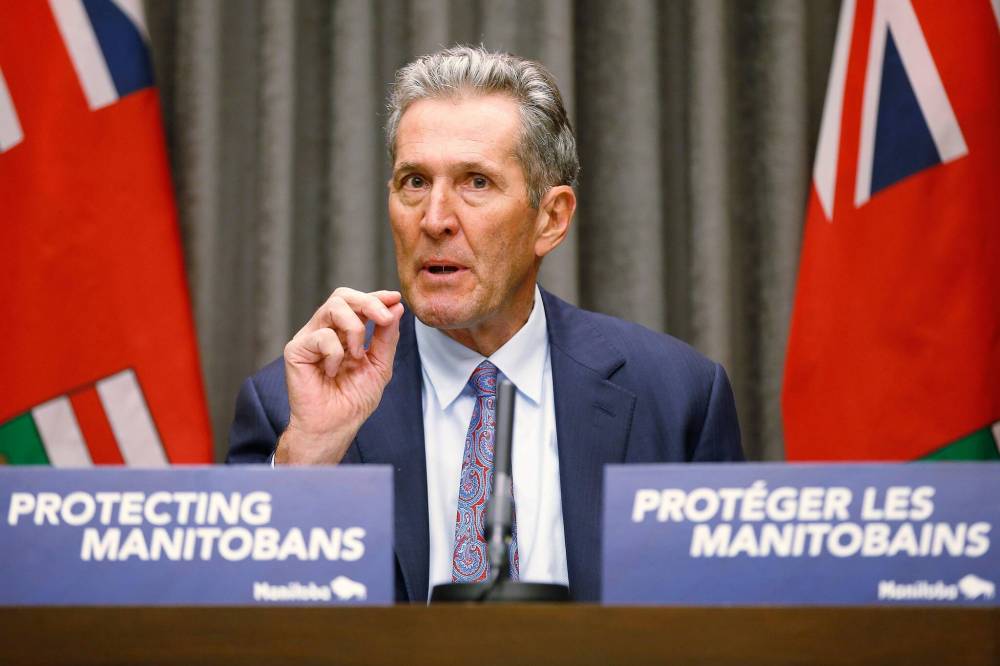
“We will not issue you a driver’s licence. You can put your car up on blocks, and you can leave it there until you pay your fine.”
He doubled fines for repeat offenders who violated public health orders and promised that those who didn’t pay them would pay in other ways.
“If you don’t drive, we will garnish your wages. You will pay,” Pallister vowed.
The provincial government followed up on his remarks, stating that unpaid fines are sent to a collections agency and “the individual would also be prohibited from obtaining or renewing a driver’s licence or vehicle registration until the amount is paid.”
Under the Provincial Offences Act, the amount of an unpaid fine is considered a debt due to the government.
It doesn’t have to collect it, though, the law professor said.
“It’s under no obligation to do so, in the same way that no one is under an obligation to enforce a civil judgment,” Kennedy said Wednesday.
“Whether it should do so is ultimately a policy decision for the government to consider in light of how much it believes it’s important to see through the results of enforcing the public health orders,” Kennedy said.
“We will not issue you a driver’s licence. You can put your car up on blocks, and you can leave it there until you pay your fine.”–Brian Pallister
The government may consider that further squeezing some Manitobans when the cost of living has soared isn’t a priority now to say nothing of the cost of enforcement, Kennedy said.
“I don’t want to say they shouldn’t, but they probably shouldn’t go through every last procedural mechanism to enforce every single fine. At a certain point, you’re trying to draw blood from a stone,” he said.
“Whether they’ve done enough to date, that’s really a judgment call that depends on how (the government) weighs varying policy goals. There’s no one right answer to that.”
When asked if failure to pay a COVID-19 fine has prevented anyone in Manitoba from renewing their licence, Goertzen said he would have to check with Manitoba Public Insurance.
“Certainly, (for) those individuals who don’t pay their fines for a variety of different things, that can be one of the punishments that goes along with that when they go to renew their driver’s licence,” the justice minister said.
— With files from Erik Pindera
carol.sanders@freepress.mb.ca

Our newsroom depends on a growing audience of readers to power our journalism. If you are not a paid reader, please consider becoming a subscriber.
Our newsroom depends on its audience of readers to power our journalism. Thank you for your support.

